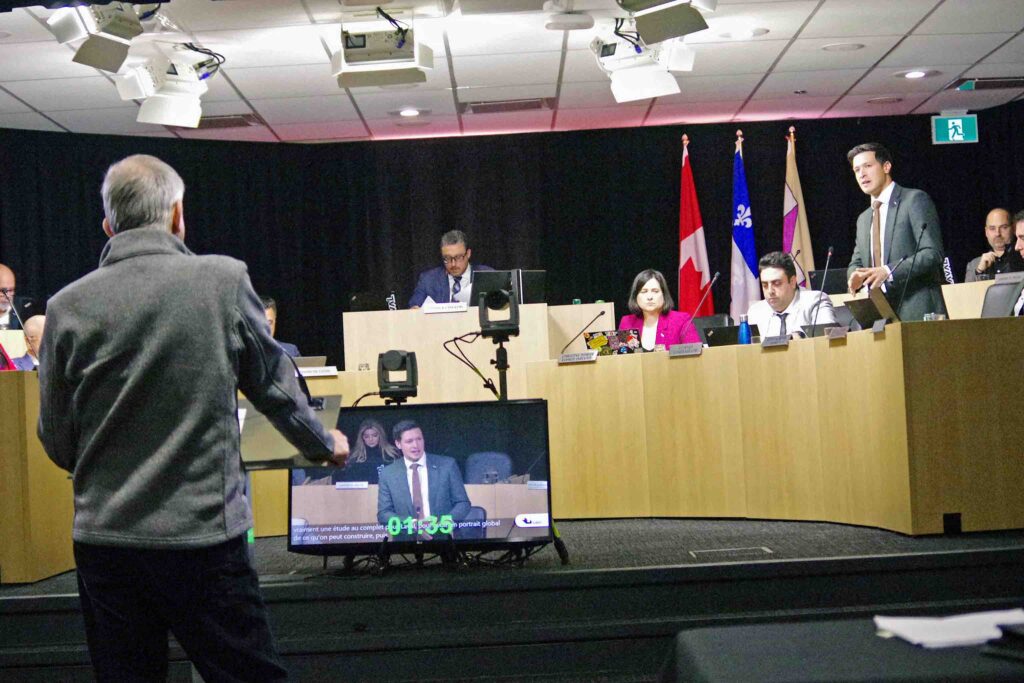
LPD union decries slowness of labour agreement talks at January council
For the second time, Laval mayor Stéphane Boyer declined during the January city council meeting to state whether he intends to seek a second term in the municipal elections set to take place on November 2.
In fact, one of the only allusions made by the mayor to the upcoming elections came during his opening remarks – which were unusually brief.
Mayor had little to say
As has been the custom for decades, the mayor usually speaks for at least a few minutes around the start of each public council meeting, delivering a summary of recent events as well as issues which may be on the radar in the weeks and months ahead.
“I wish a happy new year to all our citizens,” was almost all Mayor Boyer said. “And I take the opportunity to wish you in this municipal election year that you have exchanges which are constructive and calm for the best interests of the residents of Laval.”
During question period, former city councillor for Laval-des-Rapides Pierre Anthian noted that it was the second time in as many months that he’d asked Mayor Boyer to state whether he intended to run.
“After all, we are eight months from the elections and I think the citizens have a right to know if he [the mayor] is going to stand for election,” Anthian said.
No answer on his candidacy
While observing that Anthian himself had been a candidate for council and the mayoralty over the past three to four elections, Mayor Boyer stated plainly that he would once again not say whether he’ll be running again.
During a period reserved for the presentation of petitions, Chomedey councillor Aglaia Revelakis tabled one which was signed by more than 70 residents of Jacques Plante St. and Eliot Ave. in Chomedey. They were complaining of not being consulted prior to the implementation of bicycle paths near their homes.
“As is always the case when we don’t consult the citizens before making decisions that directly impact them, this makes them unhappy,” said Revelakis, while adding that the signers are demanding that the bike paths be withdrawn from their streets.

No police contract for a year
Sylvain Tardif, president of the Fraternité des Policiers de Laval which represents the city’s more than 700 unionized police officers, complained to the mayor and council that the police have been without a contract since January last year.
“Negotiations with the city, although they got off to a good start, have slowed down significantly since the middle of 2024,” he said. He said negotiations are now taking place in a context “where the workload of the police is growing heavier and becoming more complex.”
Citing a recent report in the Montreal daily La Presse, that up to last December gunfire incidents had increased by 100 per cent on Laval’s territory over the previous year, while other indicators also suggested increased crime, Tardif said the trend was an indicator of more serious underlying issues, and that the LPD finds itself on the front line to deal with them.
LPD union losing patience
“To assure quality service to the population, the city must offer working conditions adapted to the evolution of the responsibilities of its police,” Tardif continued. “These working conditions, matched to an approach close to the population, will allow us to improve the quality of life of citizens.”
He said measures taken by the city which have proven to be counterproductive in reaching an agreement with the police included the closing of police and municipal services offices in eastern and western Laval, “which unfortunately is adding to scepticism towards the municipal administration.”
Reacting, Fabreville city councillor Claude Larochelle, who leads the Parti Laval official opposition party, said he felt disappointed last November when the city inaugurated the new Espace citoyen building in Saint-François, when he saw that a neighbourhood police station which was supposed to be included wasn’t yet up and running because of municipal budget cuts that had been made.
Mayor Boyer explains
Mayor Boyer acknowledged that since 2019, as part of an overall plan to reform the LPD, the city had been closing some local police stations so as to have more officers out on the terrain.
But while noting that several smaller stations were closed because few residents were going there and they were doing so mostly for routine things, Boyer said the number of available police officers has remained the same.
“We preferred to invest money in various measures, various squadrons, which were created and are well known, rather than to have an officer at a counter where people fill out forms a few times per day,” said Boyer.



